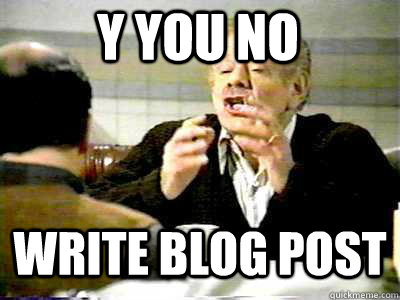 TestNG is a great tool for running tests and has some advantages over JUnit and other commonly used unit test frameworks. I personally like being able to configure test suites easily with an XML file and have the suite definition separate from the tests themselves. I also like the Maven plugin, which combined with the XML suite definition, allows for a lot of flexibility in running combinations of tests and configurations via Maven. Conversely, one thing that is not very built-out about the framework is how test parameterization works (specifically that DataProviders are only supported as Object arrays). Continue reading
TestNG is a great tool for running tests and has some advantages over JUnit and other commonly used unit test frameworks. I personally like being able to configure test suites easily with an XML file and have the suite definition separate from the tests themselves. I also like the Maven plugin, which combined with the XML suite definition, allows for a lot of flexibility in running combinations of tests and configurations via Maven. Conversely, one thing that is not very built-out about the framework is how test parameterization works (specifically that DataProviders are only supported as Object arrays). Continue reading
TestNG Parameterization with CSV Files by Keys
3 SepThe Right Questions for Interviewing Testers
29 Jul So you’ve decided to hire testers. Good for you. I know there are some organizations that may have misconceptions about the role of testers in software engineering, and some individuals even make the case that they don’t need testers. Joel Spolsky from Joel on Software previously articulated and debunked some of the more common of these misconceptions in his post Top Five (Wrong) Reasons You Don’t Have Testers. One of the interesting parts of this article, other than the responses to the misconceptions, which are dead on, is when Joel addresses “Anybody qualified to be a good tester doesn’t want to work as a tester.” He mentions that it is difficult to find good testers and that “like programmers, the best ones are an order of magnitude better than the average ones.” Anyone who has worked with testers before knows this to be true. So how do you determine which testers are a magnitude better and measure for this in an interview? Continue reading
So you’ve decided to hire testers. Good for you. I know there are some organizations that may have misconceptions about the role of testers in software engineering, and some individuals even make the case that they don’t need testers. Joel Spolsky from Joel on Software previously articulated and debunked some of the more common of these misconceptions in his post Top Five (Wrong) Reasons You Don’t Have Testers. One of the interesting parts of this article, other than the responses to the misconceptions, which are dead on, is when Joel addresses “Anybody qualified to be a good tester doesn’t want to work as a tester.” He mentions that it is difficult to find good testers and that “like programmers, the best ones are an order of magnitude better than the average ones.” Anyone who has worked with testers before knows this to be true. So how do you determine which testers are a magnitude better and measure for this in an interview? Continue reading
Scalable UI Testing with Selenium
28 May The last couple blog posts I have written have not been technical in nature, and given the information I originally intended to be discussed on this blog (testing at startups), I feel compelled to discuss a subject near and dear to me, UI testing. More specifically, I will discuss how I have implemented a sustainable UI testing framework with low maintenance that is specifically designed to avoid the pitfalls commonly associated with UI testing. Continue reading
The last couple blog posts I have written have not been technical in nature, and given the information I originally intended to be discussed on this blog (testing at startups), I feel compelled to discuss a subject near and dear to me, UI testing. More specifically, I will discuss how I have implemented a sustainable UI testing framework with low maintenance that is specifically designed to avoid the pitfalls commonly associated with UI testing. Continue reading
Computers Are People Too
13 May The study of Human Computer Interaction (HCI) is all of the rage these days. I was recently talking to some students from the Information School at UW the other day and found out that they even have a program specifically focusing on it now. When I was at the Information School, this program did not exist yet, though I do remember the curriculum having a focus on HCI, and I have even have brought up subject matter from the classes from time to time in casual conversations about technology. Since one could make the argument that the current bottleneck of the efficiency of technology is not necessarily how fast computers are as it has been in the past, but more-so how effectively interfaces can be designed to make users more efficient, a lot of HCI research studies on the nature of how people perceive computer interfaces are of prime importance now. Continue reading
The study of Human Computer Interaction (HCI) is all of the rage these days. I was recently talking to some students from the Information School at UW the other day and found out that they even have a program specifically focusing on it now. When I was at the Information School, this program did not exist yet, though I do remember the curriculum having a focus on HCI, and I have even have brought up subject matter from the classes from time to time in casual conversations about technology. Since one could make the argument that the current bottleneck of the efficiency of technology is not necessarily how fast computers are as it has been in the past, but more-so how effectively interfaces can be designed to make users more efficient, a lot of HCI research studies on the nature of how people perceive computer interfaces are of prime importance now. Continue reading
First Read Your Textbooks
2 May The idea of reading a book on leadership has always seemed ironic to me. It seems that following someone else’s ideas on what makes other people good leaders would make you a follower, not a leader, and effectively be exercising the opposite skills you need to focus on in becoming a good leader. Despite my own initial bias against books of this nature, I decided to attempt objectively reading a few leadership/management books to analyze their arguments in the context of developing leadership skills and characteristics. In addition a myriad of clichés and attempts to differentiate their conclusions from conventional thought, there are some very curious similarities between leadership books and the teachings of classical psychology. The differentiating characteristic of former is a notable lack of sound, empirical evidence which led me to the conclusion that leadership books serve little utility that cannot be achieved through study of interpersonal relationships through the lens of social science.
The idea of reading a book on leadership has always seemed ironic to me. It seems that following someone else’s ideas on what makes other people good leaders would make you a follower, not a leader, and effectively be exercising the opposite skills you need to focus on in becoming a good leader. Despite my own initial bias against books of this nature, I decided to attempt objectively reading a few leadership/management books to analyze their arguments in the context of developing leadership skills and characteristics. In addition a myriad of clichés and attempts to differentiate their conclusions from conventional thought, there are some very curious similarities between leadership books and the teachings of classical psychology. The differentiating characteristic of former is a notable lack of sound, empirical evidence which led me to the conclusion that leadership books serve little utility that cannot be achieved through study of interpersonal relationships through the lens of social science.
First Test Ranger Blog Post
26 Mar For some time, I’ve had my own domain and website with screenshots of my college projects and diagrams of code I’ve worked on in past roles as a test engineer, yet there was no really engaging blog-type content. I am not generally a blogger, though I like to write, and the previous incarnation of my site was more or less a site for me to play around with Google Apps and GWT (as it was managed through Google Apps). Despite the novelty of having my own site, as far as content on the site, it was noticeably lacking.
For some time, I’ve had my own domain and website with screenshots of my college projects and diagrams of code I’ve worked on in past roles as a test engineer, yet there was no really engaging blog-type content. I am not generally a blogger, though I like to write, and the previous incarnation of my site was more or less a site for me to play around with Google Apps and GWT (as it was managed through Google Apps). Despite the novelty of having my own site, as far as content on the site, it was noticeably lacking.
